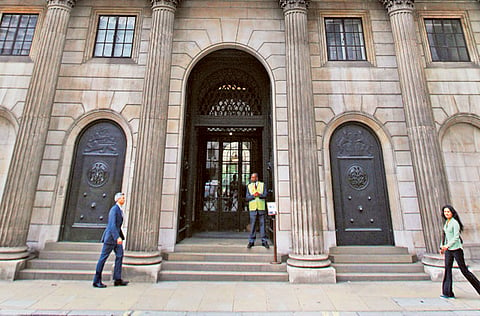UK inflation accelerates
Consumer prices rose 2.6 per cent from a year earlier

London: UK inflation unexpectedly accelerated in July for the first time in four months as airfares increased and there was some unwinding of early summer discounting by clothing stores.
Consumer prices rose 2.6 per cent from a year earlier, compared with 2.4 per cent in June, the Office for National Statistics said today in London. Economists forecast a reading of 2.3 per cent, according to the median of 35 estimates in a Bloomberg News survey. While clothes prices fell on the month, it was the smallest drop for a July since records began in 1996.
The Bank of England, which kept its bond-purchase target unchanged this month, has forecast that inflation will ease to below its 2 per cent goal next year, indicating there may be a need for more stimulus. Still, wheat, corn and oil prices have risen in the past month, which may slow the pace of cooling.
“A wet June resulted in early discounting in clothes stores, suggesting that July’s sales were less aggressive than usual,” Philip Shaw, an economist at Investec Securities Ltd in London, said before the release of the data. “There is a reasonable chance that inflation will hit the 2 per cent target later in the year,” he said, adding that there may be an impact from the “recent spikes” in food commodities.
The pound extended its advance against the dollar after the data and was trading at $1.5725 as of 9:33 am in London, up 0.2 per cent on the day. UK government bonds stayed lower, with the yield on the 10-year gilt rising 3 basis points to 1.59 per cent.
Weather, Confidence
Consumer prices rose 0.1 per cent in July from June, according to today’s report. Clothing and footwear prices dropped 2.6 per cent after a 4.2 per cent drop in June, a record for that month. The statistics office said there was anecdotal evidence that stores had brought forward summer sales.
British stores brought forward discounting amid the wettest June on record and to lure shoppers whose confidence is being undermined by a double-dip recession and the euro-area debt crisis. The economy shrank 0.7 per cent in the three months through June, the third consecutive quarter of contraction.
In addition to clothing, there was an upward impact on inflation from transport, particularly airfares, which surged 22 per cent on the month, the biggest July increase since 2004.
Core annual inflation, which excludes alcohol, food, tobacco and energy prices, accelerated to 2.3 per cent in July from 2.1 per cent in July, the statistics office said. Retail- price inflation, a measure used in wage negotiations, quickened to 3.2 per cent from 2.8 per cent. The retail-price index excluding mortgage-interest payments rose an annual 3.2 per cent.
BOE Forecasts
In a separate report today, the statistics office said UK house prices rose 2.3 per cent in June from a year earlier.
The Bank of England forecast on August 8 that inflation will slow to its 2 per cent goal by about the middle of next year and to about 1.6 per cent in two years. Producer-price inflation cooled to 1.7 per cent in July, the slowest since October 2009, the statistics office said last week.
Still, there may be upward pressure on food prices as droughts damage crops from the US to Russia. An index of 55 food items tracked by the United Nations’ Food & Agriculture Organization jumped 6.2 per cent in July, the biggest increase since November 2009.
The Bank of England will tomorrow release the minutes of this month’s policy meeting, showing how officials voted when they kept their bond-purchase target on hold at 375 billion pounds ($589 billion). The central bank increased the target by 50 billion pounds in July in a program that’s due to run until early November.
In an article in the Mail on Sunday published August 12, Bank of England Governor Mervyn King said the economy is “not at full fitness right now” and policy makers will do all they can to bolster growth.
“The conditions are in place for a recovery, and the Bank of England is, and will carry on, doing all we can to help bring it about,” he said.



